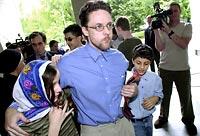Entered into the database on Saturday, March 11th, 2006 @ 16:30:10 MST
The FBI used expanded powers under the USA Patriot Act to demand information
from banks and other companies as part of the investigation of Oregon lawyer
Brandon Mayfield, wrongfully arrested in connection with the Madrid train bombings
in 2004, according to a report issued Friday. Inspector General Glenn Fine also found that, while FBI investigators did not
abuse their powers in the case, the Patriot Act anti-terrorism law "amplified
the consequences" of the FBI 's misidentification of a fingerprint by allowing
numerous agencies to share flawed information. The findings are part of a 273-page report by Fine's office that was declassified
and released Friday. It expanded on a summary released in January. The full report provides many new details about the treatment of Mayfield,
the subject of surveillance and secret searches before he was hurriedly arrested
in response to media leaks about the case. FBI examiners wrongly had identified
a fingerprint found on a bag of detonators as Mayfield's and then resisted the
Spanish police's conclusion that the print belonged to someone else, according
to the report. The report acknowledges that there was an "unusual similarity" between
the fingerprints, confusing three FBI examiners and a court-appointed expert.
But Fine's office also found that FBI examiners failed to adhere to the bureau's
rules for identifying latent fingerprints and that the FBI's "overconfidence"
in its skills prevented it from taking the Spanish police seriously. The details of the missteps, Fine said in a statement, "are important
to understanding the causes of the FBI Laboratory's misidentification of the
fingerprint and the reasons for the changes we recommend in the laboratory's
practices." The FBI declined to comment Friday. In previous statements on the case, however,
the bureau has emphasized the unusual similarities between the fingerprints
and that Fine found no misconduct by FBI employees. Mayfield's attorney, Elden Rosenthal of Portland, did not return a telephone
call Friday. Mayfield filed a lawsuit against the Justice Department, the FBI
and several FBI employees in October 2004 alleging civil-rights violations,
including a charge that he was arrested because he is a Muslim who had represented
some defendants with alleged terrorism ties. Fine's report found that although Mayfield's religion "was not the sole
or primary cause" of the initial identification, it contributed to the
FBI's reluctance to re-examine the case after it was challenged by Spanish police. One of the most notable details revealed by Friday's report was the FBI's use
of "national security letters," a form of administrative subpoena
that allows agents to demand records from banks, telephone companies and other
firms. The FBI's ability to use such letters was greatly expanded by the Patriot
Act, which was reauthorized with some changes this week. The FBI issued numerous such letters in Mayfield's case, although the exact
number is censored in Fine's report. The report says "several" letters
did not pertain directly to Mayfield, indicating that the FBI obtained records
about other individuals as well — a move that probably would not have
been allowed before the Patriot Act reforms, the report said. The report also details a series of covert searches of Mayfield's home and
office through the use of a warrant obtained under the Foreign Intelligence
Surveillance Act. Another round of searches of Mayfield's office, home and vehicles
was conducted May 6, 2004, but those were done under the authority of a regular
criminal warrant, the report said. ___________________ Read from Looking Glass News The FBI and the Myth of Fingerprints: A "100 Per Cent Certainty"

http://www.lookingglassnews.org/viewstory.php?storyid=5108